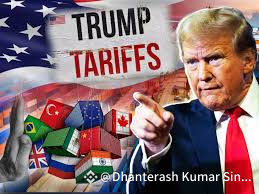#TrendingTopic #TRUMP Donald Trump’s presidency left a lasting impact on global trade and economic policy, largely due to his aggressive use of tariffs. While tariffs are primarily associated with traditional markets—such as manufacturing and agriculture—their effects rippled into newer financial sectors, including the cryptocurrency market. Although Trump was not a supporter of crypto during his time in office, his trade war strategies inadvertently helped shape its growth and visibility.
Understanding the Trump Tariffs
During his presidency, Trump imposed significant tariffs on goods imported from countries like China, the European Union, Canada, and Mexico. These tariffs, especially those on Chinese electronics and technology products, raised the cost of many goods in the U.S., disrupted global supply chains, and increased economic uncertainty.
The trade war with China alone resulted in hundreds of billions of dollars worth of goods being taxed, leading to inflationary pressures and market volatility.
How Tariffs Affected the Crypto Market
1. Increased Economic Uncertainty Boosted Crypto Demand
Tariff tensions between the U.S. and its trade partners led to global financial market instability. Investors, concerned about stock market volatility and declining fiat currency value, began seeking alternative stores of value. Bitcoin and other cryptocurrencies, often viewed as "digital gold," gained attention as hedges against geopolitical and economic uncertainty.
Weakened Trust in Fiat Currencies
As trade wars escalated, central banks in many countries responded with monetary easing policies—such as lowering interest rates or printing more money—to stabilize their economies. This eroded trust in fiat currencies and increased interest in decentralized assets like crypto, which are not controlled by governments.
Supply Chain Disruptions Accelerated Blockchain Interest
Tariffs disrupted global supply chains, especially in tech sectors. In response, businesses began exploring blockchain-based solutions to improve transparency, traceability, and efficiency. This helped raise awareness of blockchain technology beyond just cryptocurrency.
Crypto as a Tool for Cross-Border Transactions
In countries affected by U.S. tariffs, including China, there was rising interest in bypassing the U.S. dollar-dominated trade system. Some saw crypto as a potential medium for cross-border payments, further pushing adoption in certain regions.
Trump’s Stance on Crypto
Despite these indirect benefits, Trump himself was openly skeptical of cryptocurrencies. In 2019, he tweeted:
